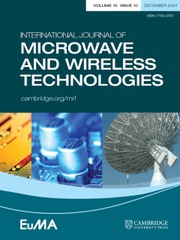Pointing enhancement techniques for deep-space antennas
Published online by Cambridge University Press: 01 July 2010
Abstract
The present paper presents a very efficient technique for enhancing the pointing accuracy in beam-waveguide (BWG) antennas and its application to the deep space antenna DSA2 of the European Space Agency. The proposed technique permits to achieve a twofold result: on the one hand, it provides a solution to the beam aberration issue, arising when the antenna simultaneously receives from and transmits to a spacecraft moving in the transversal direction. On the other hand, it allows to perform a fast conical scan to enhance the pointing accuracy of the antenna. Both results are achieved by simple linear displacements of feeds and mirrors located in the lower part of the BWG, with a very limited deterioration of the antenna gain. The required displacements of feeds and mirrors are determined through a fast optimization algorithm, based on a top-down approach, which requires repeated physical–optics analyses of the lower part of the beam waveguide only, with a significant reduction in the computing time.
- Type
- Original Article
- Information
- International Journal of Microwave and Wireless Technologies , Volume 2 , Issue 2 , April 2010 , pp. 211 - 218
- Copyright
- Copyright © Cambridge University Press and the European Microwave Association 2010
References
REFERENCES
- 2
- Cited by


